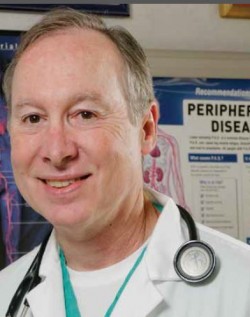Gary Menszer, MD
Though Gary Menszer completed his residency and fellowship on the East Coast, he returned to New Orleans to practice cardiology at East Jefferson General Hospital, and has remained there for the past thirty years. He is Chief of the Division of Cardiology and has been the Medical Director of Cardiac Rehabilitation since 1990.
on the East Coast, he returned to New Orleans to practice cardiology at East Jefferson General Hospital, and has remained there for the past thirty years. He is Chief of the Division of Cardiology and has been the Medical Director of Cardiac Rehabilitation since 1990.
ABOUT ME
How did you choose your specialty?
In medical school and during my residency, I was able to work with several cardiologists who greatly impressed me. Once I entered residency, I quickly discovered that I enjoyed the diagnosis and treatment of patients with cardiovascular problems. Working with technologies like echocardiography, angiography and performing procedures like coronary stenting and implantation of pacemakers and defibrillators, I do almost everything that cardiology entails, and that’s kept it interesting.
What type of procedure most challenges you?
Carotid stenting is a challenge because a tiny complication can result in a terrible outcome. It requires great concentration and technique, but for this reason it’s also incredibly gratifying.
Bi-ventricular pacing is also quite difficult. In these cases, patients who experience abnormal contraction of their heart need a special kind of pacemaker to make the heart contract normally. It’s an anatomical challenge because I need to put a lead in a location of the body that varies from patient to patient.
How do you stay on top of the latest medical advances and technology?
Every year I attend one of the two biggest conferences regarding cardiac interventions. TCT (Transcatheter Cardiovascular Therapeutics) concerns the heart, and VIVA (Vascular Interventional Advances) addresses everything related to the peripheral vascular system.
What do you do in your free time?
I spend time with my wife and kids. I have ten-year-old twins and a twelve-year old and they are all avid sailors. I also enjoy playing guitar and writing songs.
ABOUT MY PRACTICE
What is an average day on the job—if you have one?
There is great variety within cardiology and there is no way to predict what kinds of cases I’ll see. On any given day, I see hospital patients, outpatients, long-standing patients with follow ups and new consults. I perform angiograms and implant stents, pacemakers and defibrillators in the cath lab.
Most surgeries are scheduled but I also see patients who come into the emergency room for heart attacks. We have a great system for these types of emergencies: the medics now perform EKGs before bringing the patient to the hospital so that they can send out a STEMI alert, and the cath lab can be set up and the personnel ready to receive the patient. We will usually have the affected artery open within an hour of the patient’s arrival.
What is your favorite part of your job?
I love the process: I get to see patients on a personal level, listen to them, diagnose their problems, take them to the cath lab, define the cause of their problems and then fix them.
What piece of advice do you wish all of your patients would follow?
I would like patients to truly understand that improving their health is a team effort; if patients don’t comply with their doctors’ recommendations, it’s difficult to achieve a good outcome.
Why did you choose to work at EJGH?
When I first came to EJ I was impressed with everything I saw, and that is still the case. Patient care is key; everyone—from the staff to the physicians to the administration—is dedicated to taking care of patients to get the best outcome.
ADDRESS:
East Jefferson Cardiology Consultants
4200 Houma Blvd., 2nd Floor
Metairie, LA 70006
PHONE:
(504) 454-4102
RESIDENCY:
Medical College of Virginia, Richmond, VA
FELLOWSHIP:
Cardiology, Harvard Medical School, Boston, MA
BOARD CERTIFICATIONS:
Internal Medicine
Cardiovascular Disease
Interventional Cardiology
PHILOSOPHY:
“Listen to patients and show them respect. As physicians, our top priority is to take care of our patients’ health and quality of life. If we treat patients the way we want to be treated, we can’t go wrong.”
